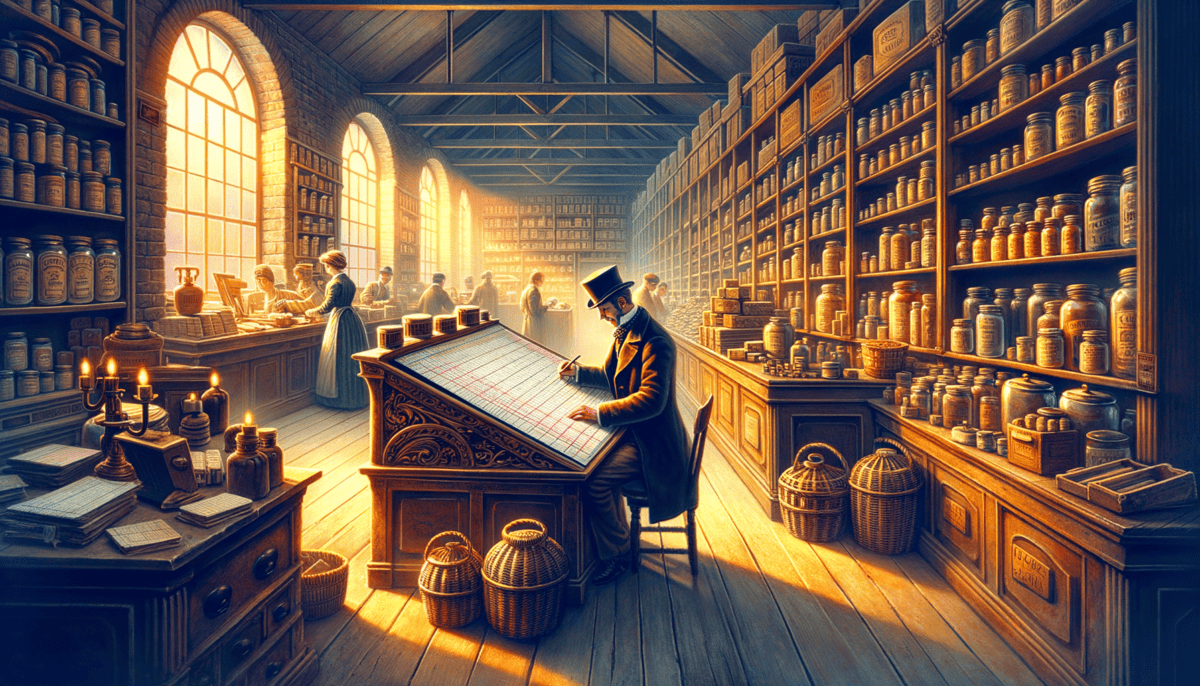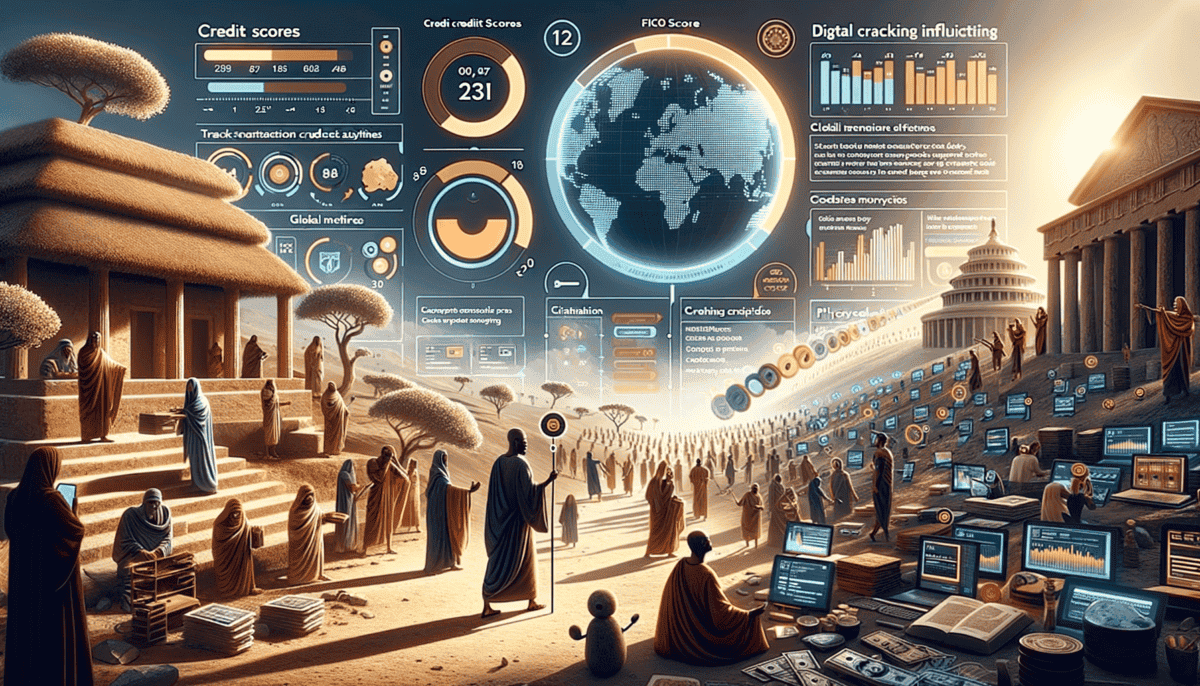The Ancient Roots of Credit
Sarah bounced excitedly in her chair as her grandfather, Papa Joe, pulled out an old leather-bound book. "Tell me a story!" she begged. Papa Joe smiled, his eyes twinkling.
"Today, I'll tell you about something very special – how people started trusting each other with money a very long time ago," he began.
Sarah wrinkled her nose. "Money? That sounds boring!"
"Oh, but it's not! It's like a magical system of trust that started thousands of years ago," Papa Joe explained. "Think of it like sharing cookies."
"I love cookies!" Sarah exclaimed.
"Well, imagine you share your cookies with a friend today, and they promise to give you their candy tomorrow. That's kind of how credit started!"
“But what if they don’t give you the candy?” Sarah asked thoughtfully.
"That's exactly the problem people faced long, long ago in a place called Babylon," Papa Joe said. "It was a big city where merchants – that's people who sold things – needed a way to keep track of who owed what to whom."
The First Credit System
Papa Joe pulled out a clay tablet from his desk. "Look at this," he said. "The people in Babylon used tablets like this one. They would make marks in the clay to show who borrowed what."
Sarah ran her fingers over the tablet's surface. "Like writing in the sand!"
"Yes! And these merchants were very clever. They created special symbols to show:"
• Who borrowed something
• What they borrowed
• When they promised to give it back
"The merchants in Babylon had a special building called a temple," Papa Joe continued. "It was like a big bank where they kept all their clay tablets safe."
Sarah's eyes widened. "Like a treasure house?"
"Exactly! And the people who worked there were very important. They were called temple priests, and they kept track of all the promises people made about paying each other back."
The Trust Game
"Let's play a game," Papa Joe suggested. He pulled out some paper and colored markers. "We'll pretend we're ancient merchants."
Sarah clapped her hands with excitement.
"I'll be a farmer with extra wheat," Papa Joe said, drawing some wheat stalks. "And you be someone who needs wheat but has beautiful cloth to trade later."
They spent the afternoon creating their own clay tablets (using play-doh), making marks to show their trades, and learning how the ancient system of trust worked.
Sarah looked thoughtfully at their play-doh tablets. "So credit is about keeping promises?"
"That's right, sweetheart. And those ancient promises grew into something we still use today – something called a credit score."
"Can we learn about that next time?" Sarah asked eagerly.
Papa Joe smiled and patted her hand. "Of course we can. But first, let's make some real cookies to share!"
Small clay tablets grew into big ideas. Those ideas would change how people around the world traded with each other forever. But that's a story for another day…
The Birth of Credit Tracking
Sarah and Papa Joe sat in their favorite reading spot the next day. The smell of fresh-baked cookies filled the air.
“Today’s story is about how people started keeping track of promises,” Papa Joe began, pulling out an old newspaper.
The First Credit Lists
“A long time ago, in the 1800s, store owners had a big problem,” Papa Joe explained. “They needed to remember who was good at paying back money they borrowed.”
Sarah munched on a cookie. “Did they write it in a book?”
“Sort of! They made special lists. Look at this old picture.” Papa Joe pointed to a yellowed page. “Store owners would write down people’s names and whether they paid on time.”
The Traveling Salesmen
“But here’s where it gets interesting,” Papa Joe continued. “Special people called ‘traveling salesmen’ would go from town to town. They carried important news about who was good at keeping their promises.”
“Like secret messengers?” Sarah asked excitedly.
“Exactly! They helped store owners know who they could trust. But there was a problem – sometimes the information wasn’t correct.”
The First Credit Bureau
“Then, in 1841, a very smart man named Lewis Tappan had a great idea,” Papa Joe said. “He created the first special office just for keeping track of credit.”
Sarah’s eyes got big. “Was it a magic library?”
“Not magic, but very special! They collected information about:
• How well people paid their bills
• If they paid on time
• How much money they borrowed
The Big Change
“As more stores opened and more people needed to borrow money, these credit offices got bigger and bigger,” Papa Joe continued. “They started using special machines to keep track of everything.”
“But sometimes mistakes happened,” Papa Joe said. “People would get mixed up, just like when you mix up your socks.”
Sarah giggled. “Like when I wore one pink sock and one purple sock to school?”
“Just like that! So they had to find a better way to keep track of everything.”
Making Things Better
“People worked hard to make the system better,” Papa Joe explained. “They made rules about:
✓ Writing down correct information
✓ Checking the information carefully
✓ Fixing mistakes quickly
“It’s like when you organize your toys,” Papa Joe said. “Everything needs to be in the right place!”
Sarah looked thoughtful. “So they made special offices just to remember if people kept their promises?”
“That’s right! And those offices grew into something even bigger and more amazing. But that story involves computers and special numbers…”
Sarah bounced in her seat. “Can you tell me that story next time?”
Papa Joe smiled and reached for another cookie. “Of course! But first, let’s talk about how you can be good at keeping your promises…”
The FICO Score Revolution
Sarah bounced into Papa Joe’s study, her eyes wide with curiosity. “You promised to tell me about computers and special numbers today!” ️
“Ah yes,” Papa Joe smiled, pulling Sarah onto his lap. “Let me tell you about two very smart friends who changed everything.”
Bill and Earl’s Big Idea
“In 1956, two friends named Bill Fair and Earl Isaac had an amazing idea,” Papa Joe began, drawing two stick figures on a piece of paper. “They wanted to make a fair way to help people get loans.”
“What’s a loan?” Sarah asked.
“It’s when you borrow money and promise to pay it back later. Like when you borrowed five dollars from your piggy bank for the school fair.”
The Magic Number Machine
“These friends built special machines,” Papa Joe continued. “These machines could look at how good people were at keeping their promises about money.”
“Like a promise-counting robot?” Sarah giggled.
“Kind of! They called it the FICO score. It’s like getting grades in school, but for how well you handle money.”
How the Numbers Work
Sarah leaned forward. “What do the numbers mean?”
“Well, everyone gets a score between 300 and 850. It’s like a game where:
| 850 | Super amazing score! |
| 700 | Pretty good score! |
| 300 | Needs more practice |
The Computer Revolution
“As computers got better, the FICO score became very important,” Papa Joe said. “Banks could now make decisions about loans much faster.”
Sarah’s forehead wrinkled. “But how do they know what number to give people?”
“Ah, they look at different things, like:
• Do you pay your bills on time?
• How much money do you owe?
• How long have you been borrowing money?
• Are you careful with new loans?
Making Things Fair
“The best part,” Papa Joe said, “is that these numbers don’t care if you’re tall or short, or what color your hair is. They just look at how you handle money.”
Sarah sat up straight. “I want to get good scores when I grow up!”
“That’s wonderful! And you’re already learning how,” Papa Joe smiled. “Remember when you saved your allowance for that special toy?”
Sarah nodded proudly. “And I didn’t spend it on candy instead!”
“That’s exactly the kind of smart thinking that helps people get good scores. But you know what’s really interesting? These scores affect many parts of your life…”
Living with Numbers
Sarah skipped home from school, clutching a bright pink flyer. “Papa Joe! Look what my teacher gave us!”
“What’s that, sweetheart?” Papa Joe adjusted his glasses as Sarah waved the paper.
The Big Move
“My friend Maya’s family is moving to a new house!” Sarah exclaimed. “But her mom looked really worried at pickup time.”
Papa Joe nodded thoughtfully. “Remember those special numbers we talked about? They’re very important when people want to move to a new home.”
Getting a Place to Live
“Is that why Maya’s mom looked sad?” Sarah asked softly.
“Sometimes landlords and banks look at credit scores before letting people rent or buy homes,” Papa Joe explained. “It’s like when your teacher checks your homework before giving you a gold star.”
Jobs and Numbers
“But wait,” Sarah’s eyes widened. “What about Maya’s dad? He’s looking for a new job!”
“That’s another place where credit scores matter,” Papa Joe said. “Some jobs check credit scores too. They want to know if people are good at handling money, especially in banks or stores.”
| Jobs That Often Check Credit: | Why They Check: |
| Bank Tellers | Handle money daily |
| Store Managers | Control store money |
| Security Guards | Protect valuable things |
Buying Big Things
“Remember when we went to buy our new car?” Papa Joe asked.
“The blue one!” Sarah clapped. “You talked to the nice lady at the desk for a long time.”
“That’s right! She was checking our credit score to see if we could get a loan for the car,” Papa Joe explained.
• Cars
• Houses
• School loans
• Mobile phones
Real Stories
“Your Aunt Lisa had to work hard to fix her credit score,” Papa Joe shared. “She forgot to pay some bills when she was younger.”
“Was she in trouble?” Sarah asked worriedly.
“No, sweetie. But she had to be extra careful with money for a while. Now she always pays her bills on time and has a great score!” ⭐
Small Choices, Big Impact
“So these numbers are like grown-up report cards?” Sarah asked, playing with her hair.
“Exactly! And just like in school, good habits make good scores. Your friend Maya’s family will be okay because they’re learning about these things too.”
Sarah hugged Papa Joe tight. “I want to help Maya feel better tomorrow. Can I tell her about credit scores?”
“That’s very kind of you,” Papa Joe smiled. “But you know what’s really interesting? The way we check these scores is changing a lot…”
Digital Money Magic
Sarah sat at the kitchen table, watching Papa Joe tap on his phone. “What are you doing?” she asked, munching her breakfast cereal.
Checking Numbers Online
“I’m using an app to check my credit score,” Papa Joe smiled. “When I was younger, we had to wait for papers in the mail!”
The Internet Money Watch
“Look,” Papa Joe showed Sarah his screen. “This app tells me if someone tries to use my name to buy things.”
“Like a money superhero?” Sarah’s eyes sparkled.
“Exactly! It watches over our money and keeps it safe.” ♂️
Around the World
“Did you know that people in other countries have different ways to check if someone is good with money?” Papa Joe asked.
“Really? How?” Sarah leaned forward, curious.
| Country | Cool Credit Facts |
| China | Uses phone apps to track money habits |
| Germany | Checks if you pay your bills on time |
| India | Uses special computer systems |
Keeping Secrets Safe
“But Papa Joe, what if bad guys try to steal our numbers?” Sarah worried.
“That’s why we have special locks on our computers and phones,” Papa Joe explained. “Like having a super-strong password!”
• Use strong passwords
• Don’t share private information
• Check your score often
• Tell grown-ups if something looks wrong
New Ways to Count
“The computer looks at lots of things now,” Papa Joe said. “Like if you pay your phone bill or streaming shows.”
“Even my cartoons count?” Sarah giggled.
“Well, paying for them on time helps show you’re good with money!”
The Big Computer Brain
“How does the computer remember all these things?” Sarah wondered.
“It’s like having a giant brain that remembers everyone’s money choices,” Papa Joe explained. “But it needs to be very careful with all that information.”
“Like keeping a big secret?” Sarah whispered.
“Exactly! And speaking of secrets, want to know something really exciting about the future of credit scores?”
“The way we use money is changing fast. Soon, we might have completely new ways to show we’re trustworthy with money!”
Sarah’s eyes grew wide. “What kind of new ways, Papa Joe?”
“Well, that’s where things get really interesting. You see, some people are thinking about…”
Building Your Money Super Powers
Sarah bounced in her seat. “Tell me more about the new ways, Papa Joe!”
Tomorrow’s Money Heroes
“Well,” Papa Joe smiled, “some people think we might use special digital coins. Others say your good actions might count too!”
“Like helping Mrs. Wilson with her garden?” Sarah asked.
“Maybe! Being good with money is like being a superhero – it takes practice and good choices.” ♀️
• Saving regularly
• Paying on time
• Making smart choices
• Helping others
Sarah’s Big Idea
Sarah jumped up from her chair. “I want to start practicing now! Can I have a piggy bank?”
“That’s a wonderful way to start!” Papa Joe beamed. “Learning about money early makes you stronger.”
The Magic of Learning
Papa Joe pulled out a shiny purple piggy bank. “This was your dad’s when he was little.”
“Really?” Sarah hugged the piggy bank. “Did it help him get good numbers?”
“It sure did! And now it’s your turn to learn the magic of saving.” ✨
Growing Up Smart
| Age | Money Skills |
| Little Kids | Save in piggy banks |
| Big Kids | Learn about bank accounts |
| Grown-ups | Build good credit scores ⭐ |
Making Dreams Come True
“When you’re bigger,” Papa Joe said, “good credit will help make your dreams come true.”
“Like buying a house with a garden?” Sarah’s eyes sparkled.
“Exactly! And maybe even starting your own business.”
• Buy a home
• Start a business
• Get a good job
• Save money
A Bright Future
Sarah placed her first quarter in the piggy bank. It made a satisfying clink.
“That’s the sound of a bright future,” Papa Joe winked.
“Can we check my piggy bank score?” Sarah giggled.
“Your score is already perfect – because you’re learning and trying your best!”
Sarah hugged her piggy bank tight. She knew that someday, just like the ancient traders and modern-day money heroes, she’d be great at taking care of her money too.
“The future of money is bright,” Papa Joe said proudly, “especially with smart kids like you leading the way!”






